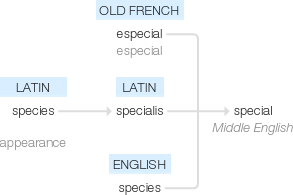Special
Middle English: shortening of Old French especial ‘especial’ or Latin specialis, from species ‘appearance’ (see species).
wiktionary
From Middle English *special, especial, especiall, from Old French especial (whence also French spécial), from Latin specialis (from species, speciei).
etymonline
special (adj.)
c. 1200, "given or granted in unusual circumstances, exceptional;" also "specific" as opposed to general or common; from Old French special, especial "special, particular, unusual" (12c., Modern French spécial) and directly from Latin specialis "individual, particular" (source also of Spanish especial, Italian speziale), from species "appearance, kind, sort" (see species).
Meaning "marked off from others by some distinguishing quality; dear, favored" is recorded from c. 1300. Also from c. 1300 is the sense of "selected for an important task; specially chosen." From mid-14c. as "extraordinary, distinguished, having a distinctive character," on the notion of "used for special occasions;" hence "excellent; precious."
From late 14c. as "individual, particular; characteristic." The meaning "limited as to function, operation, or purpose" is from 14c., but developed especially in the 19c. Special effects first attested 1951. Special interest in U.S. political sense is from 1910. Special pleading is recorded by 1680s, a term that had a sound legal meaning once but now is used generally and imprecisely. Special education in reference to those whose learning is impeded by some mental or physical handicap is from 1972.
Special pleading. (a) The allegation of special or new matter, as distinguished from a direct denial of matter previously alleged on the other side. ... (c) In popular use, the specious but unsound or unfair argumentation of one whose aim is victory rather than truth. [Century Dictionary]
special (n.)
"sweetheart, lover; special person or thing," c. 1300, from special (adj.) or from noun use of the adjective in Old French. Meaning "special train" is attested from 1866.
